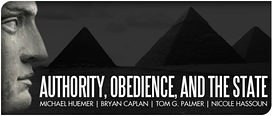Lead Essay
Michael Huemer advances two broad theses: First, we should judge government actions using precisely the same standards that we commonly employ in judging individuals’ actions; governments and their agents get no special moral status. Second, he suggests that a society without a monopoly government might not be as different different as is sometimes imagined. Those who fear corporate power should question whether government, which bears a striking resemblance to an especially large, ill-behaved, and overbearing corporation, can ever be a vehicle for social justice.
Response Essays
Bryan Caplan praises Michael Huemer’s work on the problem of political authority because it avoids the extremes of both rights-based and consequentialist reasoning. Each has notoriously foundered on difficult problems in the past, as is well-known to students of political philosophy. Huemer instead resorts to commonly shared moral intuitions, thus establishing a strong foundation for his still quite radical libertarian politics.
Tom G. Palmer suggests two areas where Huemer’s argument may need elaboration. First, he suggests that a monopolistic government authority may indeed be necessary at times in order to solve coordination problems. Rules can help coordinate behavior, but they can only do so if nearly everyone knows about them and follows them. Second, Palmer suggests that the intuitionist method may only be of limited use, as people in other times and places will not share the common intuitions of present-day westerners. If we are to make the case for human liberty, we need to make the case to them as well.
Nicole Hassoun makes the case for positive rights. Without adequate water, food, and health care, questions of consent cannot be reached in the first place. A government that does not help all its citizens to secure these things is not one we could ever reasonably consent to. Somalia suggests that in the real world, anarchy can be horrible. Pre-tax income is not a thing we own as a property right; it is simply an accounting figure. These conclusions, she argues, follow from common sense.

